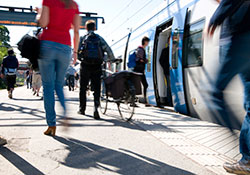Green transport benefits health, creates jobs and combats climate change

iStockphoto
Shifting towards green urban transport policies that promote public transport, cycling and walking would help not only combat climate change but also significantly improve health and the quality of urban life, and lead to new job opportunities. This was the main conclusion of an international symposium on green and health-friendly investments in transport, which was organized in Geneva, Switzerland, on 8 December 2010 by the Transport, Health and Environment Pan-European Programme (THE PEP), jointly run by WHO/Europe and the United Nations Economic Commission for Europe (UNECE).
The transport sector plays a major role in climate change, accounting for 23% of world emissions of carbon dioxide from fossil fuel combustion. Road transport alone accounts for 75% of these emissions, and this share is rising. More than 95% of road transport activities depend on oil, and these activities represent 60% of total oil consumption. This puts governments under increasing pressure to find policy options that both reduce emissions from transport and, in times of financial crisis, create job opportunities.
At the symposium, European policy-makers from national and local governments, representatives of public–private partnerships and public transport providers shared a broad range of experience with public transport, eco-tourism, walking and cycling. Discussions highlighted the large potential of investments in green urban transport policies, whose returns include cleaner environments (reduced congestion and emissions of pollutants, including greenhouse gases), stronger economies (creation of new jobs and reduction of socioeconomic inequalities) and better health. Health gains would result from better road safety and air quality, more opportunities for physical activity and the mitigation of climate change.
The participants also called for increased knowledge on the potential impact of such policies and for sharing the lessons learnt from their implementation.
The symposium, which took place while the Conference of the Parties to the United Nations Framework Convention on Climate Change and to the Kyoto Protocol (COP16) was held in Mexico, supported a stronger emphasis on the co-benefits for climate, environment and health, and the job creation opportunities achievable through green transport policy options.
THE PEP
THE PEP is a joint initiative of WHO/Europe and UNECE, which streamlines and consolidates their activities on transport, environment and health, and comprises a unique intergovernmental body in which these three sectors are equally represented. Its mandate is decided by high-level meetings.
Conclusions from the symposium also provided input to THE PEP’s Steering Committee, which met afterwards to develop its work plan for the next three years.



